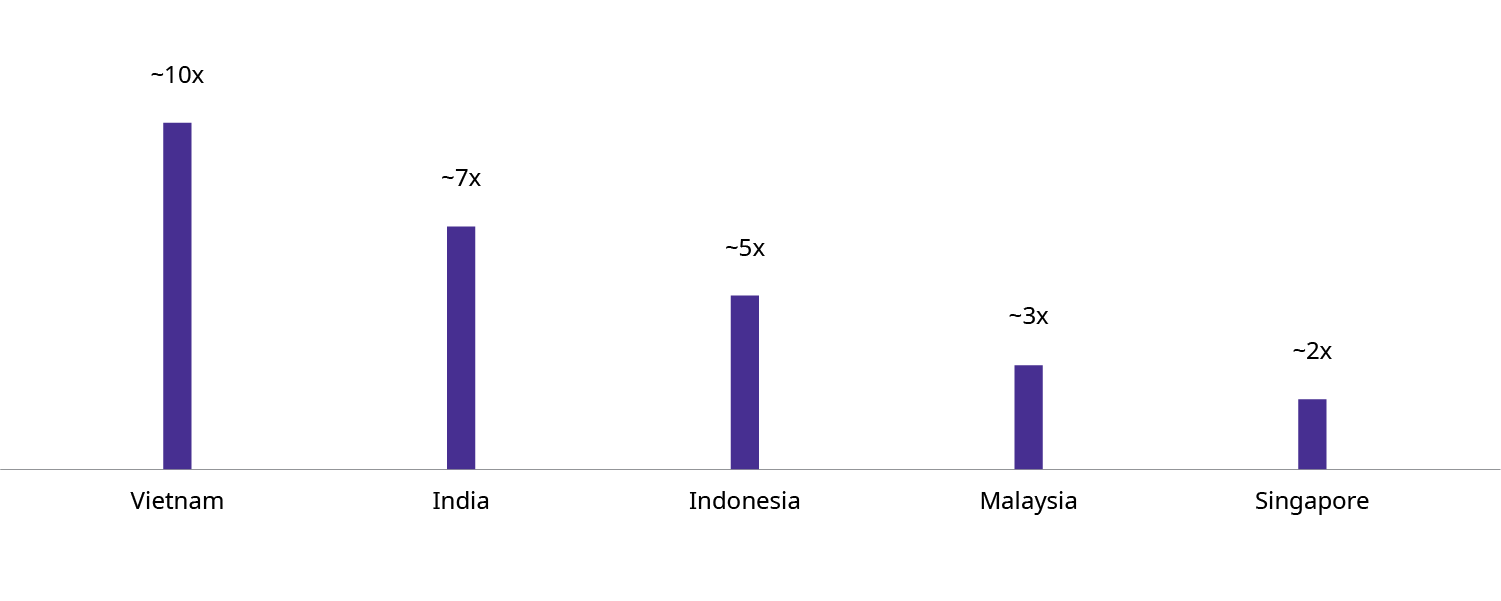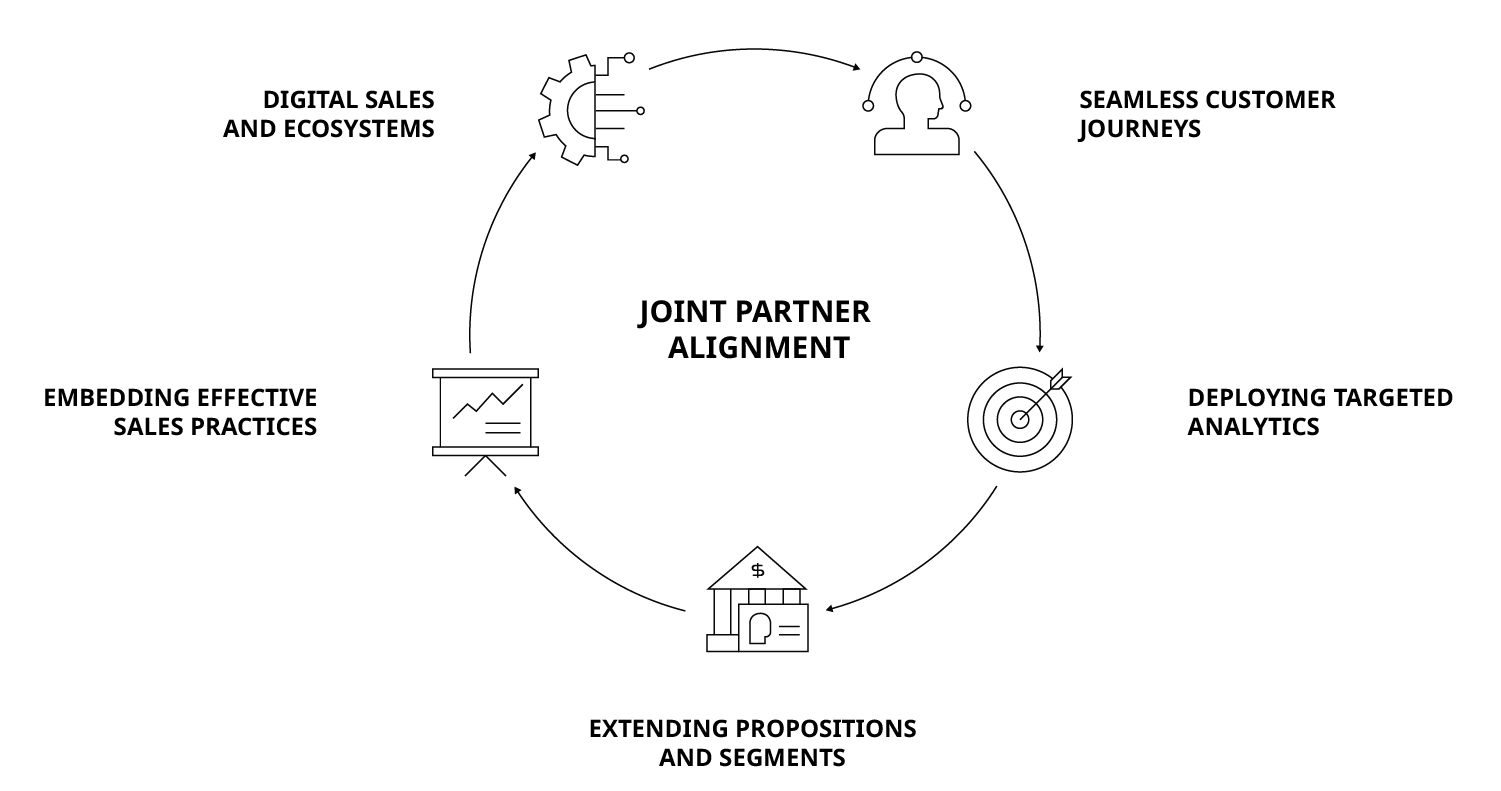The insurers’ interest in doubling down on bancassurance is epitomised by the large sums of money paid for exclusive distribution partnerships: Since 2013, there have been over 50 deals in Asia. Of the 15 deals that disclosed figures, $6 billion was reportedly paid in up-front fees alone.
Whilst some partnerships have flourished, many have not delivered on their promise. Doing more deals has been replaced by questions from shareholders and senior management on justifying the multiples paid and delivering on the promised plans. Scrutiny has intensified as it has become clear that there are large gaps in the performance of partnerships, and the initiatives to improve productivity are not delivering on expectations.
Our analysis reveals that the productivity gaps range from ~2x to ~10x and persist across multiple markets (see Exhibit 1). Whilst a number of uncontrollable factors (size, brand, franchise etc.) and deal specific factors may influence this, the fact that the difference is in multiples rather than percentage points demonstrates that there is huge opportunity for improvement. Even when comparing the median players with the leaders, the productivity gaps range from ~1.5x to ~4x.
Exhibit 1: Bancassurance productivity in Asia – leaders vs. laggards
Base on new business avg. productivity per branch (2018)

Note: Productivity figures are based on outside-in estimates basis public data to arrive at directional productivity difference, comparisons are between established banks.
Source: Regulator data, Press run, annual reports, analyst reports, expert interviews, Oliver Wyman analysis
Our experience in supporting multiple banks and insurers in driving material performance uplifts suggests that it ultimately comes down to six factors that help differentiate the leaders from the laggards (see Exhibit 2).
Exhibit 2: Oliver Wyman bancassurance value creation framework

Joint partner alignment
Alignment of the vision, culture and priorities is always clear up-front but tends to reduce over time, typically due to a change in priorities for one of the parties, change in management and/or frustration at lack of progress. Establishing strong governance at the outset, with clear success metrics and roles and responsibilities is critical. This needs to be supplemented by a periodic honest assessment of how the partnership is progressing, what is working well, and what needs to change.
Seamless customer journeys
Bancassurance customer journeys are often complex, largely due to systems not being integrated and lack of process harmony between the two parties. Ensuring the journeys are seamless isn’t straightforward for most insurers given their limited focus on this in the rest of their business and technology challenges, but ignoring this is no longer an option. Optimising the customer journeys not only helps with better experience for customers and employees, but also has a significant impact on top-line due to a reduction in leakage and an increase in retention.
Deploying targeted analytics
Data sharing agreements are often one of the most critical and undervalued component of any bancassurance agreement. Insurers that have managed to negotiate these have rarely optimised value from them, largely because of competing priorities and privacy concerns.
We see significant potential for insurers to work with banks to better understand customer needs, more efficiently target them, develop propositions that are more relevant and, importantly, engage with them in a more meaningful and privacy compliant manner. This remains the area of greatest untapped potential for insurers and those that will win will need to create the right capabilities and processes to unlock value.
Expanding customer segments
Many insurers have typically focused on optimising leads in branches and bundling insurance with loans and largely for retail customers. We see significant potential for insurers and banks by optimising non-branch channels (call centre, digital, other) and extending the products to other segments of the bank (HNW, SMEs, Corporates etc.).
Executing on this requires this being viewed as a priority for the bank and for the insurer to be able to develop bespoke product propositions and optimally service these segments whilst delivering the bank’s desired experience.
Embedding effective sales practices
Financial incentives are typically a less effective mechanism as insurance sales contribute a very low percentage of KPIs for bank sales staff and banks in many markets are concerned about conduct risk. Due to this, insurers need to pay more attention to sales force effectiveness, take a disciplined approach with a focus on continuous improvement.
We see leading players pay particular attention to having an expanding suite of non-financial rewards and using recognition as a key motivator. Additionally, granularly mapping the roles and responsibilities across both parties and scaling the resourcing and support to the bank staff are also seen to be critical drivers of value.
Digital sales and ecosystems
Driven by changing customer behaviours, banks are increasingly engaging with customers through digital / mobilechannels. Many insurers are not even integrated into the bank’s digital journeys, let alone optimising their performance through them. Further integration here also provides insurers the opportunity to deepen their engagement through participation in the banks ecosystems / partnership network and generate more leads. Finally, given digital bancassurance is expected to drive a major part of the value of deals in the future, insurers need to accelerate their capability build here.
There is a strong future for bancassurance in Asia. By effectively executing the factors above, banks and insurers can continue to accelerate value creation for themselves and continue serving the end customers in more meaningful ways.
